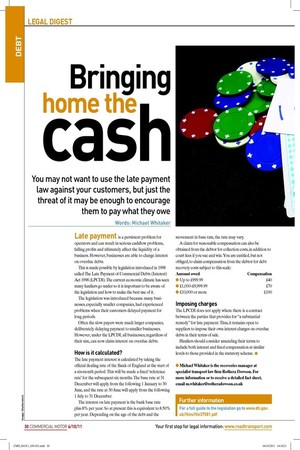Bringing
Page 22

If you've noticed an error in this article please click here to report it so we can fix it.
home the
You may not want to use the late payment law against your customers, but just the threat of it may be enough to encourage them to pay what they owe
Words: Michael Whitaker
Late payment is a persistent problem for operators and can result in serious cashfiow problems, falling proits and ultimately affect the liquidity of a business. However, businesses are able to charge interest on overdue debts.
This is made possible by legislation introduced in 1998 called The Late Payment of Commercial Debts (Interest) Act 1998 (LPCDI). The current economic climate has seen many hauliers go under so it is important to be aware of the legislation and how to make the best use of it.
The legislation was introduced because many businesses, especially smaller companies, had experienced problems when their customers delayed payment for long periods.
Often the slow payers were much larger companies, deliberately delaying payment to smaller businesses. However, under the LPCDI, all businesses, regardless of their size, can now claim interest on overdue debts.
How is it calculated?
The late payment interest is calculated by taking the oficial dealing rate of the Bank of England at the start of a six-month period. This will be made a ixed ‘reference rate’ for the subsequent six months. The base rate at 31 December will apply from the following 1 January to 30 June, and the rate at 30 June will apply from the following 1 July to 31 December.
The interest on late payment is the bank base rate plus 8% per year. So at present this is equivalent to 8.50% per year. Depending on the age of the debt and the movement in base rate, the rate may vary.
A claim for reasonable compensation can also be obtained from the debtor for collection costs, in addition to court fees if you sue and win. You are entitled, but not obliged, to claim compensation from the debtor for debt recovery costs subject to this scale: Amount owed Compensation • Up to £999.99 £40 • £1,000-£9,999.99 £70 • £10,000 or more £100
Imposing charges
The LPCDI does not apply where there is a contract between the parties that provides for “a substantial remedy” for late payment. Thus, it remains open to suppliers to impose their own interest charges on overdue debts in their terms of sale.
Hauliers should consider amending their terms to include both interest and ixed compensation at similar levels to those provided in the statutory scheme. n • Michael Whitaker is the recoveries manager at specialist transport law irm Rothera Dowson. For more information or to receive a detailed fact sheet, email m.whitaker@rotheradowson.co.uk












































